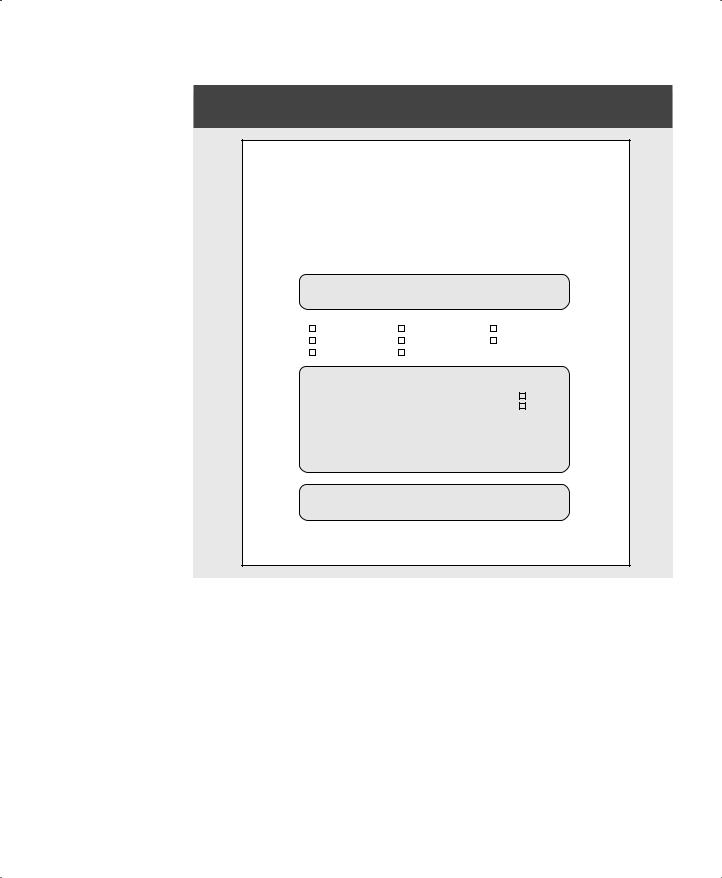
- •Contents
- •Preface
- •Acknowledgments
- •Founders of the Hotel Industry
- •E. M. Statler
- •Conrad Hilton
- •Cesar Ritz
- •William Waldorf Astor and John Jacob Astor IV
- •Kemmons Wilson
- •Ernest Henderson and Robert Moore
- •Ray Schultz
- •Historical Developments
- •Atrium Concept
- •Select-Service Hotels
- •Technological Advances
- •Marketing Emphasis
- •Total Quality Management
- •Major Reorganization, 1987–1988
- •Hotel Investment
- •September 11, 2001
- •Economic Downturn of the Late 2000s
- •Overview of the Hotel Industry
- •Types of Lodging Facilities
- •Hotels
- •Motels
- •All-suites
- •Select-service Hotels
- •Extended-stay Hotels
- •Market Orientation
- •Sales Indicators
- •Occupancy
- •Average Daily Rate (Average Room Rate)
- •Yield Percentage
- •RevPAR (Revenue per Available Room)
- •Levels of Service
- •Business Affiliations
- •Chain Affiliation
- •Referral Property
- •Company-owned Property
- •Management Contract Property
- •Brands
- •Independent Properties
- •Trends That Foster Growth
- •Leisure Time
- •The Me/Pleasure Concept
- •Discretionary Income
- •Family Size/Household Size
- •Business Travel
- •Female Business Travel
- •Travel as Experience
- •Career Development
- •Educational Preparation
- •Work Experience
- •Professional Memberships
- •Ports of Entry
- •Researching Growth Areas in the Hospitality Industry
- •Solution to Opening Dilemma
- •Chapter Recap
- •End-of-Chapter Questions
- •Notes
- •Key Words
- •Organization of Lodging Properties
- •Organization Charts
- •Typical Job Responsibilities of Department Managers
- •General Manager
- •Assistant General Manager
- •Food and Beverage Director
- •Physical Plant Engineer
- •Executive Housekeeper
- •Human Resources Manager
- •Marketing and Sales Director
- •Front Office Manager
- •Controller
- •Director of Security
- •Parking Garage Manager
- •Organization of the Front Office Department
- •Typical Front Office Organization
- •Select-service Hotel Front Office Organization
- •Function of the Front Office Manager
- •Job Analysis and Job Description
- •The Art of Supervising
- •Staffing the Front Office
- •Solution to Opening Dilemma
- •Chapter Recap
- •End-of-Chapter Questions
- •Key Words
- •Role of the Front Office in Interdepartmental Communications
- •Front Office Interaction with Other Departments in the Hotel
- •Marketing and Sales Department
- •Housekeeping Department
- •Food and Beverage Department
- •Banquet Department
- •Controller
- •Maintenance or Engineering Department
- •Security Department
- •Human Resources Management Department
- •Analyzing the Lines of Communications
- •Situation 1: Marketing and Sales Knows It All—But Didn’t Tell Us
- •Situation 2: Peace and Harmony in 507
- •Situation 3: I Know What You Said, and I Think I Know What You Mean
- •The Role of Total Quality Management in Effective Communication
- •An Example of Total Quality Management in a Hotel
- •Solution to Opening Dilemma
- •Chapter Recap
- •End-of-Chapter Questions
- •Key Words
- •Physical Structure and Positioning of the Front Desk
- •Guest First Impression
- •Creating a Balance Between Guest Flow and Employee Work
- •Selecting a Property Management System
- •Importance of a Needs Analysis
- •Procedure for Performing a Needs Analysis
- •Selecting a Team
- •Analyzing the Flow of Guests through the Hotel
- •Communicating Information
- •Reviewing Administrative Paperwork
- •Management Review of Information
- •Evaluate Needs That Have Been Identified
- •Assessing Needs Based on Findings
- •Choosing Software
- •Choosing Hardware
- •Other PMS Selection Considerations
- •Vendor Claims
- •Hardware Installation Plans
- •Computer Training Programs
- •Backup Power Sources
- •Maintenance Agreement
- •Financial Considerations
- •PMS Applications
- •Reservations
- •Revenue Management
- •Registration
- •Room Status
- •Posting
- •Call Accounting
- •Checkout
- •Night Audit
- •Inquiries/Reports
- •Back Office
- •Housekeeping
- •Food and Beverage
- •Maintenance
- •Security
- •Marketing and Sales
- •Personnel
- •Electronic Mail
- •Time Clock
- •Solution to Opening Dilemma
- •Chapter Recap
- •End-of-Chapter Questions
- •Notes
- •Key Words
- •Importance of a Reservation System
- •Overview of the Reservation System
- •Choice Hotels International
- •Hilton Hotels
- •Marriott International
- •Global Distribution Systems (GDS) in Securing Reservations
- •Role of the Internet in Securing Reservations
- •Background on Room Rates Offered via the Internet
- •Effect of Internet on Pricing Rooms
- •Consumers Response to Use of the Internet—Third-Party Websites
- •Social Media
- •Financial Effects of Third-Party Reservations
- •Types of Reservation Systems
- •Franchisee
- •Referral Member
- •Sources of Reservations
- •Corporate Clients
- •Social/Military/Educational/Religious/Fraternal (SMERF)
- •Meetings/Incentive/Conference/Event (MICE)
- •Group Travelers
- •Leisure Travelers
- •Current Guests
- •Forecasting Reservations
- •Overbooking (Occupancy Management)
- •Revenue Management
- •Processing Guest Reservations
- •Systemwide Reservation Systems
- •Outsourcing Reservations
- •Types of Reservations
- •Reservation Codes
- •Cancellation Codes
- •Blocking Procedure
- •Process of Completing Reservations through a PMS
- •Database Interfaces
- •True Integration
- •Solution to Opening Dilemma
- •Chapter Recap
- •End-of-Chapter Questions
- •Notes
- •Key Words
- •Occupancy Percentage
- •Average Daily Rate
- •RevPAR
- •History of Yield Management
- •Use of Yield Management
- •Revenue Manager
- •Components of Revenue Management
- •Definition of Yield
- •Optimal Occupancy and Optimal Rate
- •Strategies
- •Forecasting
- •Star Report
- •Block-out Periods
- •Systems and Procedures
- •Channel Management
- •Feedback
- •Management Challenges in Using Revenue Management
- •Considerations for Food and Beverage Sales
- •Applications of Revenue Management
- •Scenario 1
- •Scenario 2
- •Scenario 3
- •Solution to Opening Dilemma
- •Chapter Recap
- •End-of-Chapter Questions
- •Notes
- •Key Words
- •Importance of the First Guest Contact
- •Components of the Registration Process
- •Capturing Guest Data
- •Guest Registration Procedure
- •Guest Hospitality
- •Inquiry about Reservation
- •Completion of Registration Card
- •Review Completeness of Registration Card
- •Extension of Guest Credit
- •Room Selection
- •Room Assignment from Inventory
- •Assigning Room Rates
- •Discuss Sales Opportunities
- •Assigning Room Keys
- •Security of the Key System
- •Maintaining the Key System
- •Registration with a PMS
- •Retrieving Reservation Form
- •Checking Room Inventory Option
- •Checking Room Status Option
- •Verifying Room Rate
- •Issuing Room Key
- •Obtaining Reports from the PMS
- •Self-Check-In
- •Solution to Opening Dilemma
- •Chapter Recap
- •End-of-Chapter Questions
- •Notes
- •Key Words
- •Common Bookkeeping Practices
- •Debits and Credits
- •Forms Used to Process Guest Charges and Payments
- •Folio, Transfers, and Paid-out Slips
- •Account Ledgers
- •Guest Ledger and City Ledger
- •Posting Guest Charges and Payments
- •Point-of-sale
- •Room and Tax
- •Transfers and Adjustments
- •Paid-Out
- •Miscellaneous Charges
- •Phone
- •Display Folio
- •Reports
- •Transferring Guest and City Ledgers to Accounts Receivable
- •Solution to Opening Dilemma
- •Chapter Recap
- •End-of-Chapter Questions
- •Key Words
- •Organizing Late Charges to Ensure Accuracy
- •Guest Checkout Procedure
- •Inquiring about Quality of Products and Services
- •Retrieving the Room Key
- •Retrieving and Reviewing the Folio
- •In-room Guest Checkout
- •Determining Method of Payment and Collection
- •Credit Cards
- •Bill-to-account (Direct Billing)
- •Cash and Personal Checks
- •Traveler’s Checks
- •Debit Cards
- •Assisting the Guest with Method of Payment
- •Money Wire
- •Travelers Aid Society
- •Auto Clubs
- •International Currency Exchange
- •Obtaining Future Reservations
- •Filing Documents
- •Relaying Guest Departures to Other Departments
- •Removing Guest Information from the System
- •Transfer of Guest Accounts to the Back Office
- •Checkout Reports Available with a Property Management System
- •Guest Histories
- •ZIP Code or Postal Code
- •Developing Conventions and Conferences
- •FAM Tours
- •Origination of Reservation
- •Frequency of Guest Visit
- •Types of Room Requested
- •Room Rates versus Occupancy Patterns
- •Tracking Social Media
- •Last Impressions of the Hotel
- •Solution to Opening Dilemma
- •Chapter Recap
- •End-of-Chapter Questions
- •Notes
- •Key Words
- •Importance of the Night Audit
- •The Night Auditor
- •The Night Audit Process
- •Posting Room and Tax Charges
- •Assembling Guest Charges and Payments
- •Reconciling Departmental Financial Activities
- •Reconciling Accounts Receivable
- •Running the Trial Balance
- •Goal of Preparing the Night Audit Report
- •Preparing the Night Audit Report
- •Departmental Totals
- •Bank Deposit
- •Accounts Receivable
- •Cashier’s Report
- •Manager’s Report
- •Formulas for Balancing the Night Audit Report
- •Room and Tax
- •Total Restaurant Sales and Sales Tax
- •Tips for Restaurant, Room Service, Banquet, and Lounge Employees
- •Room Service
- •Banquet Sales
- •Banquet Bar and Total Lounge Sales
- •Room Rental
- •Valet
- •Telephone Charges
- •Gift Shop Sales and Tax
- •Vending
- •Parking
- •Total Revenue and Total Write-Offs
- •Cash Sales and Accounts Receivable Balance
- •Credit Cards and Cash Applied to Accounts Receivable
- •Analysis of Accounts Receivable
- •Bank Deposit and Amount Transferred to Accounts Receivable
- •Cashier’s Report
- •Operating Statistics
- •Daily Flash Report
- •Reading the Flash Report
- •Reading the Night Audit
- •Solution to Opening Dilemma
- •Chapter Recap
- •End-of-Chapter Questions
- •Key Words
- •Importance of Hospitality
- •Managing the Delivery of Hospitality
- •Management’s Role
- •The Service Strategy Statement
- •Financial Commitment
- •Total Quality Management Applications
- •Developing a Service Management Program
- •Guest Cycle
- •Moments of Truth in Hotel Service Management
- •Employee Buy-in Concept
- •Screening Employees Who Deliver Hospitality
- •Empowerment
- •Training for Hospitality Management
- •Evaluating the Service Management Program
- •Follow-through
- •Interfacing with Other Departments in Delivering Hospitality
- •Customer Relationship Management
- •Solution to Opening Dilemma
- •Chapter Recap
- •End-of-Chapter Questions
- •Notes
- •Key Words
- •Determining Employee Hospitality Qualities
- •Job Analysis and Job Descriptions
- •Positive Hospitality Character Traits
- •Practicing Promotional Skills
- •Screening for Hospitality Qualities
- •An Outgoing Personality
- •Patience
- •Ability to Accept Constructive Criticism
- •Interest in Selling
- •Developing an Orientation Program
- •Economic Position of the Property in the Community
- •Overview of the Lodging Establishment
- •Employee Handbook
- •Policy and Procedure Manual
- •Introduction to the Front Office Staff
- •Equipment Overview
- •Interdepartmental Cooperation
- •Administering the Orientation Program
- •Selection of Orientation Leader
- •Developing a Training Program
- •Identification of Tasks and Job Management Skills
- •Preparing Step-by-Step Procedures
- •Management Concepts
- •Steps in the Training Process
- •Preparation: Get Ready
- •Delivery: Show Me
- •Administering a Training Program
- •Cross-training
- •Developing a Trainer
- •Job Knowledge
- •Training for Empowerment
- •Americans with Disabilities Act
- •Solution to Opening Dilemma
- •Chapter Recap
- •End-of-Chapter Questions
- •Notes
- •Key Words
- •The Role of the Front Office in Marketing and Sales
- •Planning a Point-of-sale Front Office
- •Set Objectives
- •Brainstorm Areas for Promotion
- •Evaluate Alternatives
- •Devise Incentive Programs
- •Theories of Motivation
- •Douglas McGregor
- •Abraham Maslow
- •Elton Mayo
- •Frederick Herzberg
- •Applying Motivation Theories
- •Maslow
- •Mayo
- •Herzberg
- •Training Programs for a Point-of-sale Front Office
- •Train in Sales Skills
- •Develop an Attitude of Presenting Opportunities
- •Let Employees Experience Hotel Services
- •Use Role-Playing to Create Your Own Training Video
- •Budgeting for a Point-of-sale Front Office
- •Feedback
- •Guest Test
- •Financial Results
- •Planning a Point-of-sale Front Office—An Example
- •Solution to Opening Dilemma
- •Chapter Recap
- •End-of-Chapter Questions
- •Notes
- •Key Words
- •Importance of a Security Department
- •Organization of a Security Department
- •Job Analysis of the Director of Security
- •In-House Security Departments versus Contracted Security
- •Room Key Security
- •Hard-key System
- •Electronic Locks System
- •Smart Card
- •Contactless Electronic Locks
- •Fire Safety
- •General Fire Code Requirements
- •Guest Expectations
- •Fire Safety Plan
- •Employee Training in Fire Safety
- •Guest Instruction in Fire Safety
- •Fire Action Communication Procedure
- •Emergency Communication
- •Developing the Emergency Communication Plan
- •Employee Safety Programs
- •Employee Safety Committee
- •Composition and Activities of the Safety Committee
- •Department Supervisors’ Responsibility
- •Safety Training Programs
- •Solution to Opening Dilemma
- •Chapter Recap
- •End-of-Chapter Questions
- •Notes
- •Key Words
- •Importance of the Housekeeping Department
- •Overview of a Housekeeping Department
- •Relationship of the Executive Housekeeper to the General Manager
- •Management of a Housekeeping Department
- •Room Assignment/Workload
- •Outsourcing Housekeeping Activities
- •Housekeeper’s Report
- •Communication
- •Situation 1: Why Can’t Room Attendants Get Those Rooms Cleaned More Quickly, or, If That Guest Asks One More Time…
- •Inventory Control
- •Fixtures
- •Theft Control of Inventory
- •In-house Laundry versus Outsourced Laundry
- •Occupational Safety and Health Administration
- •Material Safety Data Sheets
- •Americans with Disability Compliance
- •Professional Associations
- •Role of Chief Engineer in a Lodging Property
- •Job Analysis
- •Job Description
- •Technology
- •Managing Maintenance Inter-departmental Communications
- •Energy Management
- •The Greening of the Lodging Industry
- •Leadership in Energy and Environmental Design (LEED)
- •Solution to Opening Dilemma
- •Chapter Recap
- •End-of-Chapter Questions
- •Notes
- •Key Words
- •Glossary
- •Index

196 C H A P T E R 7 ■ G U E S T R E G I S T R AT I O N
unhelpful hotel staff. A system must be in place to ensure that all travelers are extended hospitality as a standard operating procedure. The first guest contact is too vital to the delivery of a well-managed guest stay to leave it to the personal discretion of an individual.
Components of the Registration Process
The registration process is one of the many points of interaction with the guest and, ultimately, the cornerstone of delivering service before, during, and after the guest stay. Early in this section, we discuss the importance of capturing guest data that is confirmed from the previous reservation process or initiated with a walk-in guest. While guests are in our care, we can communicate with them, maintain an accurate accounting record, respond to inquiries about financial concerns, and follow up on service.
The registration process follows a succinct procedure of offering the guest hospitality, retrieving a reservation, reviewing the registration card for completeness, extending credit, selecting a room to meet the needs of the guest, checking room status, confirming room rates, promoting additional room sales, assigning room keys, and processing the guest folio. All these steps occur within the space of several minutes, but the organization behind the scenes is essential. Let’s look at how the hotel’s operational policies and procedures are developed to support a smooth registration process.
Capturing Guest Data
It is important to note at the outset the value of capturing guest data at registration. This information is used by many employees in the hotel to provide service and hospitality to the guest. It is used to transfer messages to the guest, inform the staff of the guest’s needs, check credit background, and process charges.
Guests receive phone calls, phone messages, mail, packages, and fax transmissions the hotel must deliver. Recording the proper spelling of a guest’s name, including the middle initial, during registration will assist the telephone operator and bellhop in locating the correct guest. A person with a common last name should not miss an important message just because more than one Tina S. Rodriguez, T. S. Rodriguez, or T. Samuel Rodriguez are registered at the hotel. In addition, hotel employees need to know who each guest is so standard operating procedures can be carried out. For example, the director of security wants the housekeeping staff to be alert for indications that more people are staying in a room than are registered for it. Not only does this information assist in providing security to registered guests but also it provides the hotel with additional income.
Guests’ individual needs—such as certain room furnishings (cribs or rollaway beds), facilities for people who are physically challenged, separate folios for guests splitting costs, wake-up calls, or requests for rooms on lower floors that were not indicated when the reservation was made—should be noted and communicated to the appropriate hotel

C O M P O N E N T S O F T H E R E G I S T R AT I O N P R O C E S S 197
staff. Guests who are members of a group must have their registrations handled in a special manner to expedite the process. However, it is still important that the tour leader of the group provide individual guest information and room assignments. This information is necessary so the hotel staff can locate a specific guest or deliver messages as they are received.
The front desk clerk who accepts a guest’s credit card as a means of payment must check the validity of the card and the available credit balance. Obtaining credit information from walk-ins or guests with confirmed reservations aids in the process of extending credit, billing, and collecting charges on checkout.
Guest Registration Procedure
The guest registration procedure involves several steps that, if followed accurately, allow management to ensure a pleasant, efficient, and safe visit. The process is discussed generally as these steps relate to effective front office management. Later in this chapter, use of a PMS (property management system) method of registration is discussed.
1.Guest requests to check into the hotel.
2.Front desk clerk projects hospitality toward the guest.
3.Front desk clerk inquires about guest reservation.
4.Guest completes registration card.
5.Front desk clerk reviews completeness of registration card.
6.Front desk clerk verifies credit.
7.Front desk clerk makes room selection.
8.Front desk clerk makes room assignment.
9.Front desk clerk assigns room rate.
10.Front desk clerk discusses sales opportunities for hotel products and services with guest.
11. Front desk clerk provides room key.
Guest Hospitality
The registration process begins when a guest asks to check into the hotel. The guest may arrive alone or with a group. The front desk clerk begins the check-in process with a display of hospitality toward the guest; important elements include eye contact, a warm smile, an inquiry regarding travel experience, an offer to assist the guest with a problem, and the like. As mentioned earlier, the importance of a warm welcome to a guest’s positive impression of the hotel and its staff cannot be overemphasized. Most travelers expect

198 C H A P T E R 7 ■ G U E S T R E G I S T R AT I O N
common courtesy along with a high-quality product and a well-developed delivery system. Listen to what Doug Kennedy has to offer about the importance of the guest’s front desk experience.*
Guests who have a positive experience at check-in are certain to be more understanding later, if/when they have objections or complaints later during their stay. In other words, if they have a good experience at the front desk, they will be much more forgiving later when a room service tray is delivered late, when the air conditioning breaks, or when a housekeeping request is overlooked.
Contrarily, guests who have a negative first impression can become hyper-critical; they will spend the rest of their stay almost looking for things to add to their “list,” which they will [be] giving to their attorney first thing on Monday!1
Inquiry about Reservation
After the front desk clerk welcomes the guest, he or she asks if a reservation was placed. If the guest responds affirmatively, the reservation is retrieved (called up on the computer). If the guest is a walk-in, the front desk clerk must check the availability of accommodations. If accommodations are available, the next step is to complete the registration card.
Completion of Registration Card
The registration card provides the hotel with the guest’s billing information and provides the guest with information on checkout time and room rates (Figure 7-1). Even if the guest has a reservation, the completion of the registration card is important, as it verifies the spelling of names, addresses, phone numbers, anticipated date of departure, number of people in the party, room rate, and method of payment.
The top portion of the registration card supplies information about the guest, so the hotel has an accurate listing. With this information, phone calls, messages, and the like can be relayed as they are received. This record is also used for billing purposes. If the hotel has parking facilities, the garage manager needs information on the guest’s car for security and control purposes. Obtaining complete and accurate information is important in hotels that use a PMS; this electronic folio form is preprinted. (Author’s note: Some hotels do not use a registration card because the details of a reservation are recorded electronically. Therefore, the hotel’s policy is to bypass this step in the registration process and have the desk clerk confirm the details of the guest’s information in the following step.)
Review Completeness of Registration Card
The front desk clerk should quickly review the completeness of the registration card or electronic folio. For example, the handwriting should be legible, and the electronic form should have all appropriate boxes completed. If a revised registration card must be printed, now is the time to do it. The guest may forget to fill in a ZIP code, which is used
*Source: Doug Kennedy is President of Kennedy Training Network Inc. www.KennedyTrainingNetwork.com.

C O M P O N E N T S O F T H E R E G I S T R AT I O N P R O C E S S 199
F I G U R E 7 - 1 A registration form is used in a PMS and is often preprinted for guests
who have reservations.
Hotel Registration
NAME |
|
GUEST |
FIRM |
|
DEPART |
ADD. |
|
ARRIVE |
ROOM |
AGENT |
TYPE |
RATE |
|
|
ON CHECKING OUT, MY ACCOUNT WILL BE SETTLED BY:
|
CASH |
|
CARTE BLANCHE |
|
PERSONAL CHECK |
|
|
|
|||
|
AMERICAN EXPRESS |
|
MASTERCARD / VISA |
|
OTHER (SPECIFY) |
|
|
|
|||
|
DINERS CLUB |
|
DISCOVER |
_________________ |
|
|
|
||||
|
(LAST) |
|
(FIRST) |
|
(INITIAL) |
NAME________________________________________________________________
HOME
BUSINESS
STREET______________________________________________________________
CITY_____________________________________ STATE________ ZIP__________
COUNTRY____________________________________________________________
COMPANY____________________________________________________________
SIGNATURE
WHILE THE HOTEL IS NOT RESPONSIBLE FOR ANY LOSS IN YOUR GUEST ROOM OR
AUTOMOBILE, IT IS ADVISABLE THAT MONEY, JEWELS, AND OTHER VALUABLE ITEMS
BE PLACED IN THE SAFETY DEPOSIT BOXES AT THE FRONT DESK.
by the marketing and sales department to analyze market demographics as well as by the controller’s office to process invoices. If a guest does not know a license plate number or other auto information, the desk clerk must explain that this information is necessary for security. If the desk clerk follows up this statement with a phone call to the garage attendant to obtain the necessary information, the effort will be appreciated by the guest, security officer, and garage manager.
Any areas on the registration card that remain blank should be called to the guest’s attention. Such omissions may be oversights, or they may be an effort by the guest to commit fraud. The guest who does not supply a credit card and gives a weak excuse (“I forgot it in my car” or “It’s in my suitcase, which the airline is delivering in three hours”), combined with a front desk clerk who accepts these reasons, sets the stage for fraud. A busy front desk clerk may forget to obtain this information later in the day.
